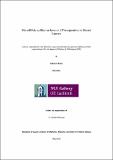| dc.description.abstract | Micro(mi)RNAs have potential as both therapeutics and circulating biomarkers of disease. This study investigates potential breast cancer biomarkers miR-138, miR-504 and miR-379. Furthermore, it investigates the impact that differences in starting material, collection, storage and extraction have on the miRNA profile. These variables alone, impacted the expression of stably expressed endogenous control, miR-16. Different starting material also impacted on the presence or absence of miR-138 and miR-504. While miR-504 was significantly elevated in the whole blood of patients with breast cancer when compared to healthy controls irrespective of methods of collection, storage or extraction.
While miR-379 did not function as a biomarker for detecting breast cancer, previous work has shown it to be significantly reduced in primary breast tumour tissue and having therapeutic potential. This study used an invasive breast cancer cell line, HCC-1954, to further evaluate miR-379 as a therapeutic miRNA. Cells were transduced for enriched miR-379 expression (HCC-379) or a scramble sequence (HCC-NTC) and administered into an animal model. Ex vivo analysis revealed an increase in tumour necrosis and a decrease in lymph node invasion in tumours with elevated miR-379 expression. Investigation of a potential role for miR-379 in regulating COX-2, revealed an inverse relationship at an mRNA level, further confirmed at a protein level.
For delivery of miR-379, the tumour homing capacity of Mesenchymal Stem Cells(MSCs) were employed. MSC-secreted exosomes natively package and deliver miRNAs and may reflect the tumour targeted potential of parent MSCs. To exploit this, MSCs were transduced for enriched expression of miR-379 in both the parent cell and secreted exosomes. An in vivo study was established to investigate any therapeutic efficacy of either MSC-379 or MSC-NTC cells, or exosomes secreted by the cells. Quantitative bioluminescence revealed a significant reduction in tumour activity in animals that received exosomes enriched with miR-379 systemically.
Data presented highlights factors impacting the potential for clinical utility of miRNAs as circulating biomarkers of disease. Furthermore, this data also supports miR-379 as a potential therapeutic in breast cancer. Engineering MSC secreted exosomes enriched with miR-379 holds exciting potential as a novel therapy for breast cancer. | en_IE |


